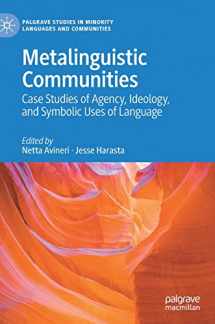
Metalinguistic Communities: Case Studies of Agency, Ideology, and Symbolic Uses of Language (Palgrave Studies in Minority Languages and Communities)
Book details
Summary
Description
Review
“Metalinguistic Communities: Case Studies of Agency, Ideology, and Symbolic Uses of Languages offers a wide array of deeply ethnographic explorations of symbolic uses of language to create broad communities of belonging. This volume’s emphasis on interactions and relationships moves us beyond narrow focuses on “fluency” or “grammaticality” to broadly inclusive and emic perspectives on language use, inviting us into a community-centered and decolonial approach to understanding how communities make use of a range of language practices in constituting themselves. Each case study provides a powerful challenge to dominant language ideologies about “good” or “authentic” language use, centering community agency and linguistic wealth instead. I highly recommend this important and rich work.”
-Jocelyn Ahlers, Professor, Linguistics & Chair, Liberal Studies Department, California State University, San Marcos
“In this important volume, the authors hail our full attention to the new ways that languages are recruited to the task of nucleating communities and conferring valued identities to their members. Through wonderfully detailed and ethnographically contexted studies from across the globe, Metalinguistic Communities displays the broad range of meaningful projects that non-dominant languages perform through the agency of their members in acts of identity, place-making, belonging, and authority construction.”
-Paul V. Kroskrity, Professor of Anthropology, UCLA. Regimes of Language: Ideologies, Polities and Identities (2000), Engaging Native American Publics: Linguistic Anthropology in a Collaborative Key (2017) (co-edited with Barbra Meek).
“In as much as these ethnographic case studies explore local and particular details, they also reveal similarities of outward orientation. Indigenous and minority metalinguistic communities are shown, at their heart, to be counter-hegemonic projects. By claiming a language as their own, historically marginalized people represent themselves in terms that are also at least partially recognizable from the institutions of the relevant dominant society. A community becomes visible to itself by becoming visible to yet others. The key concern is with recognition and valorization. Fluency and/or shift to the heritage language in other domains of life may not be a central concern. By defining the problem of metalinguistic communities, the book illuminates a recurrent theme in the applied linguistics literature: tensions between minority heritage language projects and professional linguistics and language education. Disciplinary experts can be embraced as allies or avoided for imposing unwelcome scrutiny and inconvenience. This collection makes sense of that tension; and poses, with Leonard’s conclusion, terms from which to move forward collaboratively.”
-Marybeth Nevins, Associate Professor, Anthropology and Director, Linguistics Program, Middlebury College
This edited volume brings together ten compelling ethnographic case studies from a range of global settings to explore how people build metalinguistic communities defined not by use of a language, but primarily by language ideologies and symbolic practices about the language. The authors examine themes of agency, belonging, negotiating hegemony, and combating cultural erasure and genocide in cultivating meaningful metalinguistic communities. Case studies include Spanish and Hebrew in the USA, Kurdish in Japan, Pataxó Hãhãhãe in Brazil, and Gallo in France. The afterword, by Wesley L. Leonard, provides theoretical and on-the-ground context as well as a forward-looking focus on metalinguistic futurities. This book will be of interest to interdisciplinary students and scholars in applied linguistics, linguistic anthropology and migration studies.


We would LOVE it if you could help us and other readers by reviewing the book
Book review



